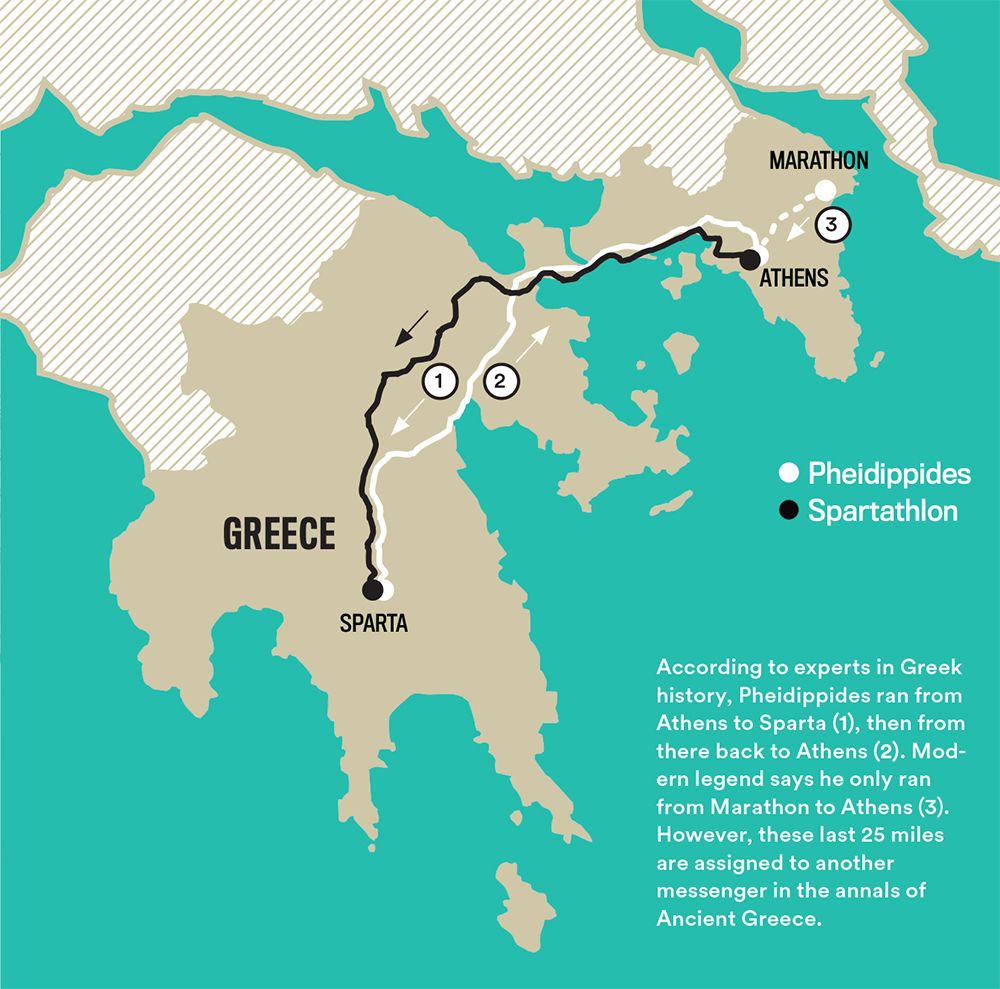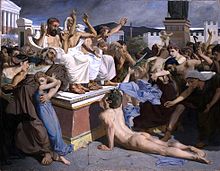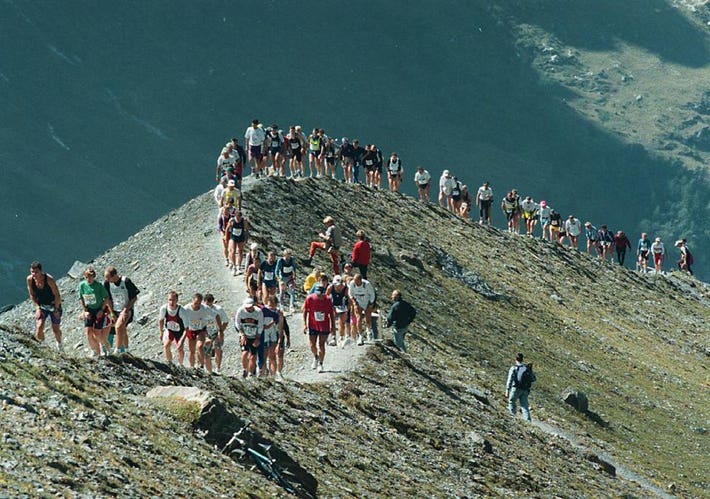Marathon Origin Story
The marathon originates from ancient Greece and the legendary run of Pheidippides. Dating back to 490 BC.
With its roots in Greek history, the marathon is a prestigious race that has evolved over centuries to become a symbol of endurance and determination worldwide. This iconic race has inspired countless individuals to push their limits and embrace the spirit of competition.
From its humble beginnings to its present-day prominence in the world of sports, the marathon continues to captivate both participants and spectators alike. Let’s delve deeper into the fascinating origin story of the marathon and explore how it has become a celebrated event that embodies the essence of human resilience and athleticism.

Credit: www.nationalgeographic.com
Ancient Origins
Ancient origins of the marathon date back to 490 BC, when the Greeks faced a formidable threat from the Persians. This historic event spun the captivating tale of heroism that has transcended time, shaping the marathon into a symbol of determination and endurance.
The Birth Of The Marathon
The marathon as we know it today finds its earliest roots in the Battle of Marathon. Fought between the Athenians and the Persians, this pivotal conflict resulted in a resounding victory for the Athenians. Following their triumph, it is said that a brave soldier, named Pheidippides, ran from the battlefield to Athens to deliver the message of victory.
The Legend Of Pheidippides
Legend has it that Pheidippides, a courier and professional runner, embarked on an epic journey from the battlefield of Marathon to Athens. His mission was to deliver the momentous news of the Athenian victory. Running breathlessly through rugged terrain and enduring fatigue, Pheidippides completed the extraordinary feat. This monumental act of heroism solidified his place in history, igniting the enduring legacy of the marathon.

Credit: www.runnersworld.com
Revival In Modern Olympics
Revival in Modern Olympics brought back the Marathon, a race that traces its origins to ancient Greece. This historic event, known for its endurance and perseverance, captivates athletes worldwide.
Introducing The Marathon In Athens 1896
The marathon made its debut in the modern Olympics in Athens 1896.
It was inspired by the legendary run of Pheidippides.
The distance of 26.2 miles commemorates his journey from Marathon to Athens.
The Impact Of Spiridon Louis
Spiridon Louis, a Greek runner, won the first Olympic marathon.
His victory captivated the hearts of the Greek people.
Louis’s triumph symbolized the spirit and glory of the marathon.
Evolution Of The Marathon
The Evolution of the Marathon has been a fascinating journey through the annals of time, reflecting the enduring spirit of human endurance and athletic prowess. Let’s delve into the key milestones that have shaped the Marathon into the iconic race it is today.
Early Changes And Standardization
In the early days, Marathons often varied in distance, ranging from approximately 25 miles to 26.2 miles. Standardization began in 1908 when the distance was set at 26.2 miles from Windsor Castle to White City Stadium in London.
Introduction Of Women’s Marathon
The inclusion of women in the Marathon was a pivotal moment in the history of the sport. In 1984, the first Women’s Marathon was held at the Los Angeles Olympics, marking a milestone for gender equality in sports.
Technological Advances In Marathon Racing
Technological advancements have revolutionized Marathon racing, with innovations such as lightweight shoes, moisture-wicking apparel, and GPS tracking devices enhancing athletes’ performance and safety.
Famous Marathon Moments
The history of marathons is filled with iconic and unforgettable moments that have left a lasting impact on the sport. From incredible displays of endurance to record-breaking achievements, these famous marathon moments have captivated and inspired people worldwide.
The Miracle On The Han River
In 1988, the Miracle on the Han River took place at the Seoul Olympic Games. South Korean marathon runner, Sohn Kee-chung, who represented Japan due to Korea’s annexation by Japan, won the gold medal. As he crossed the finish line, he proudly displayed the Korean flag, an act of defiance against the forced use of the Japanese flag. This emotional and symbolic moment has cemented itself in marathon history as a powerful display of national pride and resilience.
Breaking The 2-hour Barrier
Breaking the elusive 2-hour barrier in the marathon was a monumental achievement. In 2019, Eliud Kipchoge shattered this barrier during the INEOS 1:59 Challenge, completing the distance in an astonishing 1:59:40. This extraordinary feat not only showcased Kipchoge’s unparalleled skill and endurance but also ignited a new era of possibilities and potential within the sport of marathon running.
Global Marathon Events
The marathon is one of the most popular and prestigious races in the world, attracting runners of all ages and abilities. With roots dating back to ancient Greece, marathons have come a long way in modern times. Today, marathon events are held in various locations across the globe, each with its own unique charm and experience.
The Big Five Marathons
The Big Five Marathons are considered some of the most iconic and challenging races in the world. They attract elite runners and enthusiasts alike, showcasing breathtaking landscapes and offering a true test of endurance.
Emerging Marathons In Asia
Asia has witnessed a surge in popularity of marathons in recent years, with a number of emerging races that have captured the attention of runners worldwide. These marathons showcase the rich cultural heritage and stunning landscapes of the continent, providing a unique experience for participants.
Ultra-marathons And Adventure Races
In addition to traditional marathons, there is a growing trend of ultra-marathons and adventure races that push the limits of human endurance. These events often take place in extreme environments and cover longer distances than conventional marathons.
With distances ranging from 50 kilometers to several hundred kilometers, these races attract hardcore endurance athletes looking for a new challenge. Adventure races often combine various disciplines such as running, climbing, cycling, and kayaking, providing a thrilling experience for participants.
Whether you are looking to tackle one of the Big Five Marathons, explore the emerging marathons in Asia, or take on the ultimate challenge of an ultra-marathon or adventure race, the world of marathon events offers something for everyone. Lace up your running shoes, embrace the spirit of competition, and embark on a journey that will test your limits and leave you with lifelong memories.

Credit: www.britannica.com
Frequently Asked Questions Of Marathon Origin Story
What Is The Origin Story Of Marathons?
In ancient Greece, a messenger ran from Marathon to Athens to deliver the news of victory.
Why Do People Participate In Marathons?
Marathons are a test of endurance, pushing participants to achieve personal goals while supporting causes.
How Has The Meaning Of Marathons Evolved Over Time?
From a historical event, marathons now symbolize determination, camaraderie, and personal triumph over challenges.
Conclusion
The Marathon’s origin story is one of endurance, perseverance, and unity. Its rich history reflects the evolution of human athleticism and the celebration of sheer determination. The legends of Pheidippides and the Battle of Marathon have left an indelible mark on our modern running culture, inspiring countless athletes to reach for their own personal victories.
So, next time you lace up your running shoes, remember the courageous roots of the Marathon and let it fuel your own journey towards greatness.







